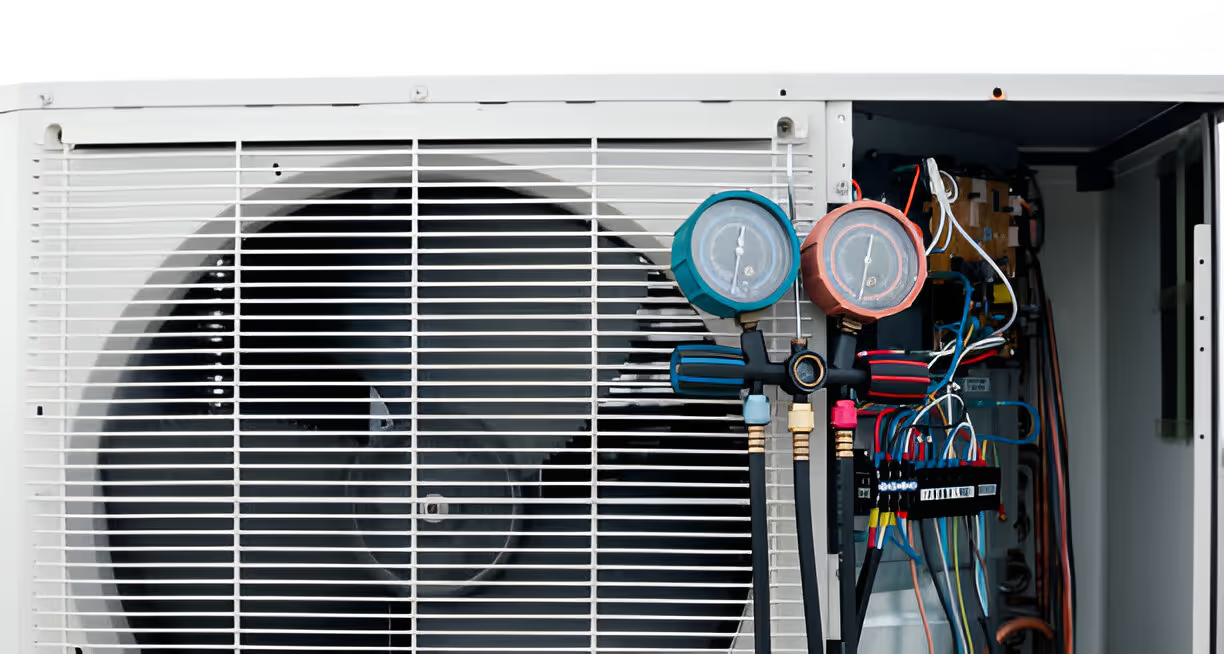Heat Pump Maintenance in Sicklerville, NJ
Heat Pump Maintenance in Sicklerville, NJ
Keeping your heat pump operating efficiently year-round requires more than the occasional filter change. In Sicklerville, NJ, where humid summers and occasional cold snaps put extra stress on HVAC equipment, a comprehensive heat pump maintenance program preserves comfort, reduces energy costs, and protects warranties and rebate eligibility.

Why proactive heat pump maintenance matters in Sicklerville homes
Sicklerville’s climate—warm, humid summers and variable winters—means heat pumps run nearly all year for both cooling and heating. High humidity increases coil fouling and makes systems work harder during summer, while cold snaps and freeze/thaw cycles in winter lead to frequent defrost cycles and potential ice buildup on outdoor units. Regular maintenance:
- Preserves efficiency so your system uses less electricity.
- Reduces the risk of mid-season breakdowns during peak demand.
- Keeps warranties and utility rebate documentation intact by providing timely service records.
- Extends system life and supports consistent indoor comfort.
Common heat pump maintenance issues in Sicklerville, NJ
- Reduced airflow caused by dirty filters or clogged return vents.
- Icing or excessive defrost cycles during cold stretches.
- Dirty outdoor coils from pollen, dust, and seasonal debris.
- Refrigerant undercharge or leaks that lower performance.
- Electrical wear: loose connections, failing capacitors, or worn contactors.
- Malfunctioning reversing valve or thermostat calibration issues.
- Clogged condensate drains leading to water damage or indoor humidity problems.
What a comprehensive heat pump maintenance program includes
A well-designed maintenance plan goes beyond a basic check. Key components include:
- Routine inspections and testing
- Visual and functional checks of indoor and outdoor units.
- Verify refrigerant pressures and temperature differential across the coil.
- Test defrost cycle and reversing valve operation.
- Preventive care and cleaning
- Replace or inspect air filters and recommend correct MERV ratings.
- Clean indoor evaporator and outdoor condenser coils to restore heat transfer.
- Clear debris and check unit base for drainage and proper airflow.
- Flush condensate drain lines and sanitize pans as needed.
- Performance monitoring and tune-ups
- Measure electrical draw and tighten connections to prevent failures.
- Lubricate motors where applicable and check fan operation.
- Verify thermostat settings and recalibrate controls for accurate comfort.
- Priority scheduling and service plan benefits
- Priority access during peak heat or cold periods reduces downtime.
- Pre-scheduled seasonal visits (spring and fall) ensure timely tune-ups.
- Maintenance plans commonly include inspection checklists and documented service history.
- Record-keeping for warranties and rebates
- Detailed service records capture dates, component serial numbers, and work performed.
- Proper documentation supports manufacturer warranty claims and helps qualify for local or state energy-efficiency rebates in New Jersey.
Typical maintenance intervals and what to expect during a visit
- Twice a year: Full inspection and tune-up (spring for cooling season, fall for heating season). This is the industry-recommended baseline for heat pumps that provide both heating and cooling.
- Every 1–3 months: Replace or clean filters depending on occupancy, pets, and filter type (more frequent if washable filters or high dust exposure).
- Annually: Check refrigerant charge and test electrical components.
- Every 1–2 years: Deep coil cleaning and advanced diagnostics if system shows reduced performance.
What the technician typically does during each visit:
- Check and record system performance metrics (temperatures, pressures, amp draw).
- Inspect and replace filters, clean coils, and clear outdoor unit obstruction.
- Test thermostat, controls, and safety switches.
- Inspect refrigerant lines, insulation, and condensate drainage.
- Document findings and recommendations in a clear service report.
Homeowner tips to maintain efficiency between professional visits
- Replace or clean filters regularly (monthly to every three months). A visibly dirty filter is costing efficiency.
- Keep at least 2 feet of clearance around the outdoor unit; trim grass, weeds, and remove leaves.
- Gently hose down the outdoor coil in early spring and after heavy pollen seasons; avoid pressure washers and use a soft brush if needed.
- Maintain consistent thermostat setpoints and use programmable or smart thermostats to avoid unnecessary cycling.
- Check for and seal obvious duct leaks and ensure vents are unobstructed by furniture.
- During winter, avoid shoveling snow onto the outdoor unit and clear ice carefully if necessary; excessive manual force can damage fins.
- Keep maintenance records and receipts—photographs of equipment nameplates and serial numbers help when filing warranty or rebate paperwork.
How regular maintenance improves long-term value
Routine maintenance reduces emergency repair frequency and preserves system capacity so your heat pump meets design expectations for comfort and efficiency. In Sicklerville, where seasonal humidity and temperature swings add stress, well-maintained systems:
- Run quieter and deliver more consistent indoor temperatures.
- Use less energy—often translating into noticeable monthly savings.
- Achieve longer service life and better resale value for your home when documented maintenance history is available.
Consistent, documented maintenance is the best way to protect your heat pump investment and ensure dependable comfort throughout Sicklerville’s seasons. Regular inspections, combined with simple homeowner care between visits, keep systems operating at peak performance and maintain eligibility for warranty and energy rebate programs.
Customer Testimonials
Our customers consistently praise our exceptional service and quality products, highlighting their satisfaction and loyalty.


